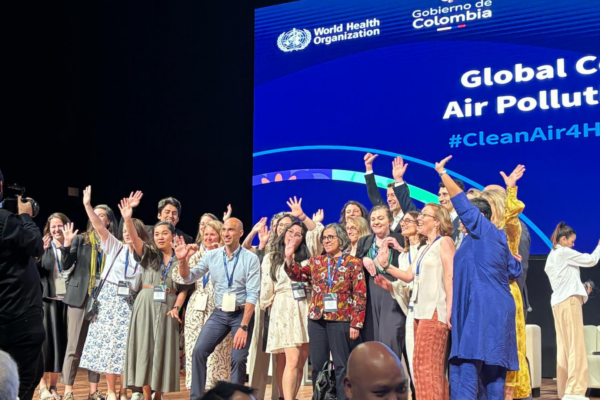Governments agreed to step up international efforts to reduce the health impacts of air pollution and climate change at the 78th World Health Assembly (WHA) in Geneva, from 19-27 May 2025.
Member states approved the World Health Organization’s (WHO) updated roadmap for an enhanced global response to the adverse health effects of air pollution. The plan includes a voluntary target to halve premature deaths caused by anthropogenic air pollution by 2040.
Government representatives requested more expert guidance from the WHO to develop effective policies across major polluting sectors, including energy, transport and industry, to reach the target. Countries also called for guidance to progress towards WHO air quality guideline levels to protect public health.
Resolution links clean air to lung health
Air pollution was highlighted as a priority for prevention and prognosis of diseases including asthma, lung cancer, chronic obstructive pulmonary disease (COPD), pneumonia and COVID-19 in a new WHA resolution on lung health. The resolution was led by the government of Malaysia with support from 13 countries, including Bangladesh, China, Egypt, Japan and Thailand.
The resolution calls on governments to strengthen awareness of the health impacts of air pollution, and enhance national air quality standards and monitoring. The WHO is mandated to provide recommendations for new initiatives and measurable targets to WHA in 2027, including for prevention of lung diseases.
Hard-won progress on climate action
Whilst the air pollution roadmap and lung health resolution received resounding endorsement from governments, negotiations to approve a new WHO global action plan on climate change and health were fraught. Last year, governments agreed a resolution on climate and health mandating the WHO to develop the action plan. The action plan represents WHO’s proposed work on climate change mitigation and adaptation of health systems over the coming years.
While the action plan was approved without formal opposition, several fossil-fuel producing countries abstained from voting, as reported by Health Policy Watch.
Health benefits of clean air make economic sense
Ahead of the WHA78 decisions, Clean Air Fund hosted an event to make the investment case for clean air to the global health community. Chair of the Our Common Air Commission, Rt. Hon. Helen Clark, emphasised the staggering economic burden of air pollution – over US$8 trillion per year or 6% of global GDP – contrasting with “frankly pathetic international funding for air quality projects”. Dr Maria Neira, Director of Climate, Environment and Health at WHO, highlighted that the institution sees the health benefits of clean air as the heart of the economic case for climate action, with the potential to save 2 million lives per year over the coming years.
Economic experts, Natalia Linou of UNDP and Christie Oliver from Haleon, presented new findings on the financial case for clean air investment, including the latest Economist Impact Health Inclusivity Index, supported by Haleon. Helena Naber from the World Bank reiterated that halving the number of people exposed to harmful levels of particulate matter (PM2.5) pollution by 2040 is feasible and affordable.
Watch the event recording:
A growing issue in global decision making
The unprecedented number of climate and clean air side events at WHA78 signal the rising strategic importance of these issues in global health decision making. The health community, coordinated by our partner Global Climate and Health Alliance, hailed the importance of the climate action plan, but highlighted that the text failed to call out fossil fuels as the major driver of climate and air pollution health harms. Clean Air Fund will continue to raise air quality up the global health agenda and advocate for the many benefits of clean air measures.


